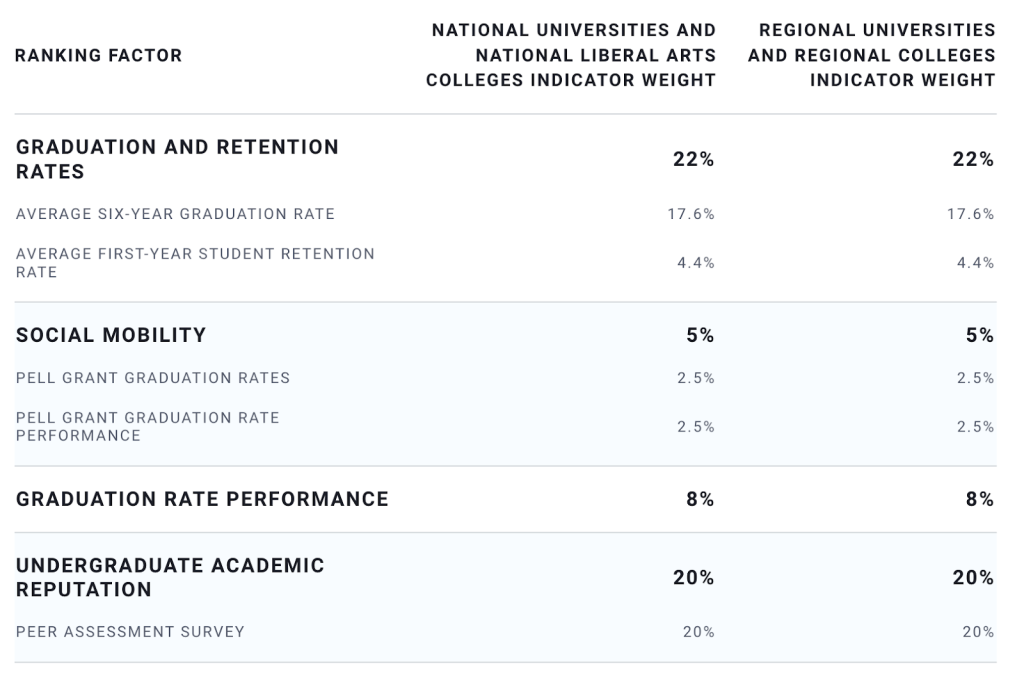In an attempt to address some of the recent negative press, US News & World Reports is changing how it evaluates law and medical schools. They are reducing the emphasis on reputation and selectivity (only for law and med schools), which have never been a true reflection of educational value.
“Reputation” as a category has long been a sticking point for critics of the US News & World Reports ranking system. For undergraduate universities it is still the category with the second largest weight. It is seen from the outside as a way to ensure that the colleges which are “thought” to be at the top more or less stay at the top.

And that isn’t to say that there is no value in a degree from Harvard or Yale or other top ranking schools. It certainly sounds impressive in an interview. But a student who was accepted into Harvard and then chose to go to a less selective school has the same earning potential as if they had gone to Harvard. What’s more, US News and World Reports knows this fact and reported on it a decade ago.
In addition to that, selectivity can be gained. It was once pseudo wisdom championed by Harvard admissions people that a student “never knew” if they would wind up getting in, so why not apply anyway. It was so common that the wisdom is still floating around on forums.
But every time they got a little choosier, their rank went up a bit.
So for law schools and med schools, the two kinds of schools which have been recently pulling out of the rankings, US News will decrease the weightage given to reputation surveys and by selectivity in determining school rankings. Both will still factor in, but at a lower rate.
Selectivity had included standardized test scores and with so many schools going test-optional or test-blind that metric has already decreased in utility.
In their place, the value of employment rates, bar exam pass rates, and residency placements are all going up. In a concrete sense, these factors are seen as more indicative of a school’s ability to prepare students for their professions and measure the outcomes of their education.
There is a tension here between people who are well served by the current ranking system, people who do not like ranking systems of any kind, and people who do not like US News & World Reports specific brand of ranking. While so much recent evidence has showcased the lack of utility behind standardized options like the SAT or the rankings discussed here, it seems unlikely that the long term result will be to toss rankings out entirely.
A technocratic hope for rankings and tests in general is that the results will become more AI powered. “What are the top 10 Med Schools for me” seems like an interesting idea if an AI can know enough about you to generate that kind of information well. And it is possible (or even likely) that Harvard would still make the list.
But lists like this could still wind up being pretty similar for most people. Asking an AI to rank schools simply moves the question of “how” they are ranking things out from an interrogatable but flawed method and into a black box whose answers are generated in ways we can’t possibly know. If this is yet another problem that AI is slated to solve, it seems very unlikely that US News & World Reports would play much of a role in that AI ranked future.
More Stories
Tutoring as a part of teaching / Everything comes back to money
One of the difficult things with education is our reliance on a “one size fits all” model. We have for...
Public K-12 Enrollment is falling and that is dangerous and exciting
A surprising result of COVID and the resulting school closures is that many parents, after struggling to figure out how...
SIGGRAPH at 50
SIGGRAPH , the premier conference on computer graphics education, held its 50th event last week in Los Angeles. Back in...
School Board Meetings in Crisis
School Board meetings across the US have become a new flashpoint in the culture wars that have been dividing the...
Biden is forgiving $40 Billion in student loan debt through “administrative fixes”
We talk a lot about big, sweeping policy changes because those are the kind of things that make for easier...
The Supreme Court has taken aim at students
The republican majority supreme court has now decided two important cases we’ve previously reported on; Biden’s student debt forgiveness and...
